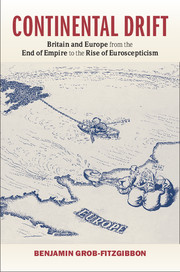Book contents
- Frontmatter
- Dedication
- Contents
- Acknowledgements
- List of abbreviations
- Introduction
- Part 1 Imperial Europeans
- Part 2 Post-imperial Eurosceptics
- 10 At sixes and sevens
- 11 Towards the Common Market
- 12 The rise of the anti-Marketeers
- 13 Empire eclipsed, Europe embraced, Britain rejected
- 14 Entering the promised land? Britain joins ‘Europe’
- 15 Seasons of discontent
- 16 Half-hearted Europeans
- 17 Mrs Thatcher, John Major and the road to European Union
- Conclusion: Post-imperial Britain and the rise of Euroscepticism
- Notes
- Bibliography
- Index
17 - Mrs Thatcher, John Major and the road to European Union
from Part 2 - Post-imperial Eurosceptics
Published online by Cambridge University Press: 05 May 2016
- Frontmatter
- Dedication
- Contents
- Acknowledgements
- List of abbreviations
- Introduction
- Part 1 Imperial Europeans
- Part 2 Post-imperial Eurosceptics
- 10 At sixes and sevens
- 11 Towards the Common Market
- 12 The rise of the anti-Marketeers
- 13 Empire eclipsed, Europe embraced, Britain rejected
- 14 Entering the promised land? Britain joins ‘Europe’
- 15 Seasons of discontent
- 16 Half-hearted Europeans
- 17 Mrs Thatcher, John Major and the road to European Union
- Conclusion: Post-imperial Britain and the rise of Euroscepticism
- Notes
- Bibliography
- Index
Summary
On 3 July 1982, Margaret Thatcher spoke to a crowd gathered at Cheltenham. It had been a heady three months for the Prime Minister. Upon announcing the invasion of the Falkland Islands on 3 April, she had been accused by the Labour Party in the House of Commons of abject failure, of bringing a final humiliation to Britain in one of its last colonial possessions. This weighed heavily upon her, already conscious of and sensitive to British decline. In his diary, the Conservative MP and historian Alan Clark described ‘how low she held her head, how knotted with pain and apprehension she seemed’. In a second parliamentary debate later that week, her predecessor Jim Callaghan held the Prime Minister personally responsible for the war and lambasted British unpreparedness, saying, ‘we are sending an aircraft carrier that has already been sold to meet cash limits, from a port that is to be closed, and with 500 sailors holding redundancy notices in their pockets’. But war transforms a person for better or worse, and this was certainly the case with the British Prime Minister. By the time it was all over, ‘All over the world, Margaret Thatcher now became a figure of legend, the embodiment of strong leadership, more famous, perhaps, than any other political leader at the time’.
Addressing the crowd at Cheltenham, she reflected on what the Falklands War had meant for Britain. ‘We have ceased’, she said, ‘to be a nation in retreat. We have instead a newfound confidence – born in the economic battles at home and tested and found true 8,000 miles away. … And so today we can rejoice in our success in the Falklands and take pride in the achievement of the men and women of our task force. But we do so, not as at some flickering of a flame which must soon be dead. No – we rejoice that Britain has rekindled that spirit which has fired her for generations past and which today has begun to burn as brightly as before. Britain found herself again in the South Atlantic and will not look back from the victory she has won’. There was no need to ask which ‘spirit’ had been lost and rekindled, nor in what way Britain had ‘found herself again’.
- Type
- Chapter
- Information
- Continental DriftBritain and Europe from the End of Empire to the Rise of Euroscepticism, pp. 423 - 460Publisher: Cambridge University PressPrint publication year: 2016



